The Impact of Economic Factors on Pilot Training
In the world of aviation, pilot training is an integral component that ensures the safety, efficiency, and reliability of air travel. However, the journey to becoming a qualified pilot is heavily influenced by various economic factors. Understanding these influences can help aspiring pilots, training institutions, and policy makers make informed decisions. This article explores the impact of economic factors on pilot training, offering insights, statistics, and actionable tips for those navigating this complex field.
The Cost of Pilot Training: A Major Economic Factor
One of the most significant economic factors affecting pilot training is its cost. According to the Aircraft Owners and Pilots Association (AOPA), the cost of obtaining a private pilot license can range from $5,000 to $15,000. For those pursuing a commercial pilot license, costs can soar to anywhere between $70,000 and $100,000, primarily due to the extensive hours of flight training required.
The high cost of training is often a deterrent for many aspiring pilots. However, there are ways to mitigate these expenses:
- Scholarships and Grants: Numerous organizations offer financial aid to help aspiring pilots cover training costs. Research and apply for scholarships through institutions like Women in Aviation International or the Experimental Aircraft Association.
- Financing Options: Many flight schools offer financing plans, allowing students to pay for their training over time rather than upfront.
- Military Service: Joining military aviation programs can provide training without direct costs, with the added benefit of serving one’s country.
Economic Cycles and Their Influence on Pilot Demand
Economic cycles have a significant impact on the demand for pilots. During periods of economic growth, airlines expand their fleets and routes, leading to a higher demand for pilots. Conversely, during economic downturns, airlines may reduce operations, leading to pilot furloughs and decreased hiring.
A study by Boeing projected a need for 763,000 new pilots globally over the next two decades, driven by fleet growth and pilot retirements. However, these projections are susceptible to economic fluctuations:
- Economic Booms: Increased travel demand during economic booms often results in airlines hiring more pilots, creating numerous opportunities for newly trained aviators.
- Economic Recessions: During recessions, airlines may freeze hiring or lay off pilots, making it challenging for new graduates to find employment.
To navigate these cycles, aspiring pilots should stay informed about industry trends and consider diversifying their skills. For instance, obtaining additional ratings (such as instrument or multi-engine) can make candidates more attractive to employers.
Technological Advancements and Their Economic Implications
Technological advancements are reshaping the aviation industry, impacting pilot training. Modern aircraft are equipped with sophisticated avionics systems, requiring pilots to be adept at operating advanced technology. This has economic implications on training programs:
- Simulator Training: Flight simulators are increasingly used in training to replicate real-world scenarios safely and cost-effectively. While the initial setup is expensive, simulators reduce costs in the long run by minimizing aircraft wear and tear.
- Online Learning Platforms: The rise of online education platforms allows students to access theoretical training modules remotely, reducing the need for on-site instruction and associated costs.
Embracing technological advancements can enhance training efficiency and cost-effectiveness. Aspiring pilots should seek programs that integrate modern technologies into their curriculum.
Government Regulations and Economic Challenges
Government regulations play a crucial role in shaping the pilot training landscape. Regulatory requirements can influence training duration and content, impacting costs:
- Minimum Flight Hours: Regulations often dictate the minimum flight hours required for pilot certification. These requirements ensure safety but also contribute to training costs.
- Security and Compliance Costs: Compliance with safety and security regulations can add financial burdens to training institutions, which may pass these costs onto students.
Understanding regulatory requirements and their economic implications is crucial for aspiring pilots. Engaging with regulatory bodies and industry associations can provide valuable insights and networking opportunities.
Regional Variations in Pilot Training Economics
The cost and availability of pilot training vary significantly across regions due to differences in economic conditions, regulatory environments, and resource availability. For instance, pilot training in the United States might differ from that in Europe or Asia in terms of cost and duration.
- Localized Costs: The cost of living, fuel prices, and availability of training facilities can influence the overall expenses of pilot training in different regions.
- Market Demand: Regions with higher demand for pilots may have more competitive pricing for training programs, while areas with lower demand might experience higher costs.
Prospective pilots should research and compare training options across different regions to find programs that align with their financial and career goals.
Actionable Tips for Aspiring Pilots
Given the economic challenges associated with pilot training, here are some actionable tips for aspiring pilots:
- Start Early: Begin exploring pilot training options and accumulating flight hours as early as possible to spread out costs over time.
- Leverage Networking: Connect with professionals in the aviation industry through events, social media, and alumni networks to gain insights and opportunities.
- Consider Part-Time Jobs: Taking on part-time jobs in aviation-related fields can provide income and valuable experience.
- Stay Informed: Keep up with industry news and trends to anticipate economic shifts and adapt accordingly.
Conclusion: Navigating the Economic Landscape of Pilot Training
Becoming a pilot requires significant investment, both financially and personally. By understanding the economic factors impacting pilot training, aspiring pilots can make informed decisions and strategically plan their career paths. Whether through exploring funding opportunities, embracing technology, or adapting to market demands, there are ways to navigate the economic challenges of pilot training successfully. Ultimately, a proactive and informed approach can pave the way for a rewarding career in aviation.
Become a Flight Attendant and Get Paid to Travel The World – Click Here!
